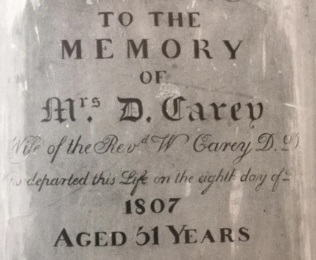Dorothy Carey
William and Dorothy Carey
Dorothy Carey
 In
1781, William Carey, a 19-year-old shoemaker with a burden to share the Gospel,
married an illiterate 25-year-old peasant named Dorothy Plackett and settled
down in a village in Northamptonshire, England. In 1782, William Carey began preaching every other Sunday,
and in 1789 began
to pastor a small Baptist church. Preaching and pastoring limited his shoemaking income,
so they lived
in poverty, but Dorothy Carey did not complain and bore him five children, two
of whom died young.
In
1781, William Carey, a 19-year-old shoemaker with a burden to share the Gospel,
married an illiterate 25-year-old peasant named Dorothy Plackett and settled
down in a village in Northamptonshire, England. In 1782, William Carey began preaching every other Sunday,
and in 1789 began
to pastor a small Baptist church. Preaching and pastoring limited his shoemaking income,
so they lived
in poverty, but Dorothy Carey did not complain and bore him five children, two
of whom died young.
At a Baptist Missionary Society meeting in a neighboring town in 1793, William Carey decided on his own to become a missionary to India, and then announced to Dorothy that their family needs to move to India. Dorothy Carey, then 37, had never traveled more than a few miles from her village; feeding the children with the meager sum that William brought home was already difficult; she was pregnant with their sixth child; and he wanted to move where? She said no.
On April 4, 1793, William Carey departed for India with their 8-year-old son. He didn't tell Dorothy that they will return or visit after a few years. He didn't tell her that he will continue to financially support her, their two younger children left with her or their child in her womb. William Carey simply abandoned his wife and younger children.
William and his oldest son ended up taking a different ship than the one originally intended, so they were stuck in England for several months, during which Dorothy Carey gave birth to their sixth child, and William had time to return home and again try to convince her to join him. This time, Dorothy gave into his pressure and agreed to go, provided that her younger sister could come along to help her. She could, so they sailed, but Dorothy Carey wasn't happy.
Soon after arriving in India, Dorothy Carey's sister met and married an Englishman and moved away. William Carey moved his family from the relative comfort and safety of Calcutta, a large city, into a rural area. He again focused on ministry, so they were once again poor, but this time in rural India, with roaming tigers, malaria, and dysentery, to which their 5-year-old son succumbed in less than a year.
Stricken with grief, herself sick with dysentery for a year, and without the sister whose support she had counted on, Dorothy Carey snapped and lost her sanity. She began to falsely accuse William of adultery. Her husband already had betrayed her in England by deciding to abandon her, their younger children, and take her oldest son away from her. Her broken mind surmised that a man who already had done that to her must be betraying her also with other women. So she cursed him verbally, attacked him physically, chased him around in public, and even tried to kill him.
William Carey thought Dorothy would be mistreated at an insane asylum, so he kept her in a locked room at his house, and translated the New Testament into Sanskrit while hearing his wife rave in madness. Dorothy Carey never regained her sanity and died in 1807 after 12 years of mental anguish. Before and after her death, William Carey also neglected their children as he focused on ministry.
William and Dorothy Carey are a sad and cautionary tale of what could happen if a missionary who arguably should have remained single marries, especially a spouse who isn't called to the mission field.